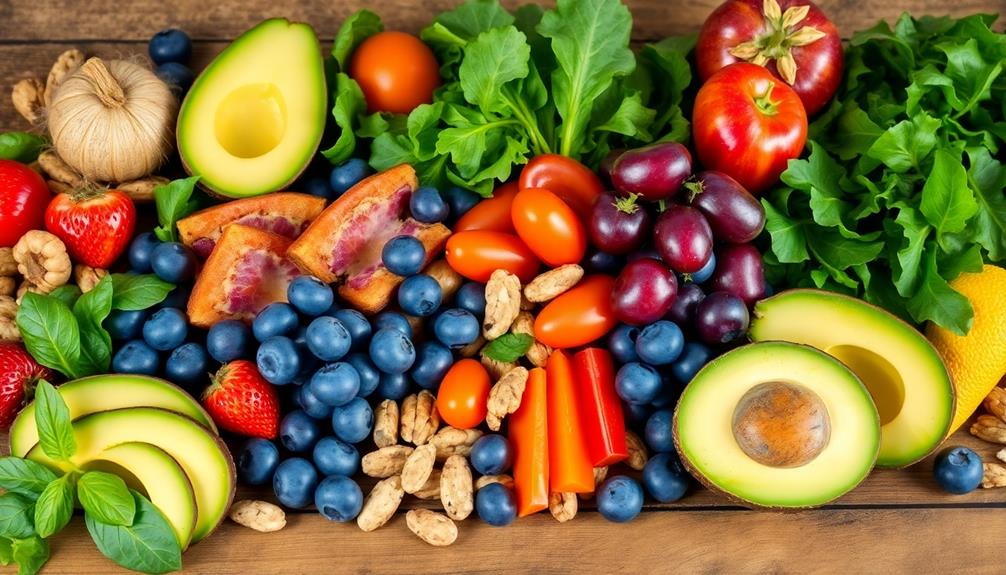Your diet can have a huge impact on your mental health! Eating a balanced diet filled with yummy, whole foods can help boost your mood and keep you feeling great. Here are some key nutrients to remember:
- Omega-3s from fish like salmon
- B Vitamins from leafy greens
- Fiber-rich foods like fruits and whole grains
Staying consistent and choosing colorful options is essential for your happiness. Plus, a healthy gut supports your brain, making you feel even better! So, let's explore more about how nutrition can brighten your day and enhance your well-being!
Key Takeaways
- A balanced diet rich in nutrients like omega-3s, B vitamins, and antioxidants is crucial for mental well-being and reducing depression and anxiety.
- The gut microbiome plays a significant role in mood regulation, with a diverse microbiome linked to lower anxiety and depression levels.
- Consuming high-fiber foods supports gut health, which in turn influences mental health by promoting serotonin production.
- Dietary patterns emphasizing whole, unprocessed foods enhance emotional stability and foster a positive relationship with food.
- Regular meals and mindful eating practices can stabilize energy levels, reduce irritability, and improve overall mental health.
Understanding Diet and Mental Health
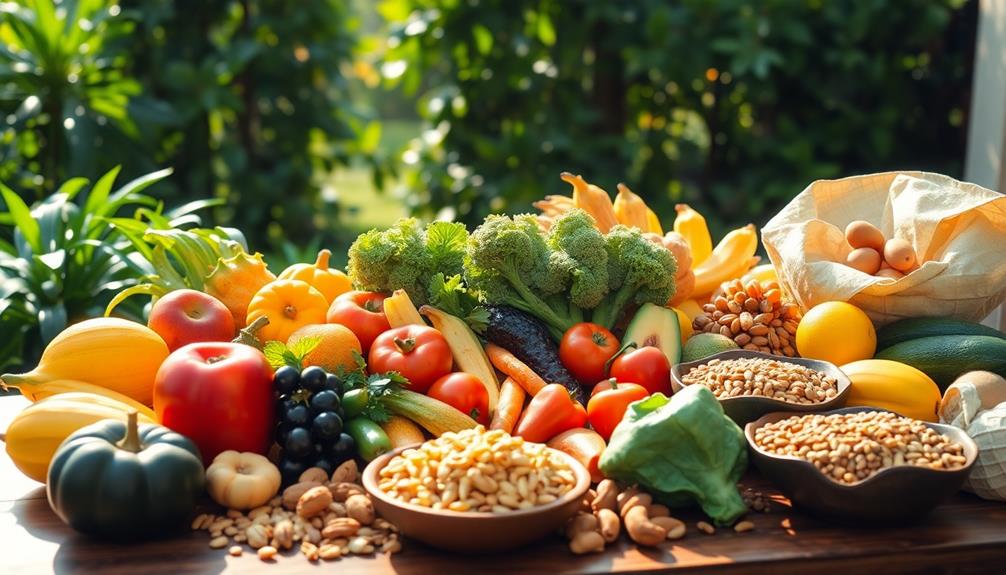
In recent years, researchers have increasingly focused on the connection between diet and mental health. It's exciting to learn that what you eat can influence how you feel! Eating a balanced diet is essential for nutrition and mental health. Nutritional deficiencies, like low omega-3 fatty acids and vitamins B6, B12, and D, can lead to increased risks of depression and anxiety.
Incorporating diverse and flavorful meals, such as mushroom masala, can't only satisfy your taste buds but also contribute to a healthier diet.
Here's where the gut microbiome comes in. A healthy gut plays a significant role in your mood and brain function. Eating a variety of foods can help keep that microbiome diverse, which is linked to lower rates of depression and anxiety.
Consider the Mediterranean diet! It's packed with plant-based foods, healthy fats, and lean proteins, making it a tasty way to support your mental well-being.
To boost your cognitive functioning, try incorporating these nutrient-dense foods into your meals:
- Fruits and vegetables
- Whole grains
- Healthy fats like nuts and avocados
With these delicious foods, you can improve your mood and feel fantastic. So, let's celebrate the joy of eating well for a happier mind!
Nutrients That Boost Mental Well-Being
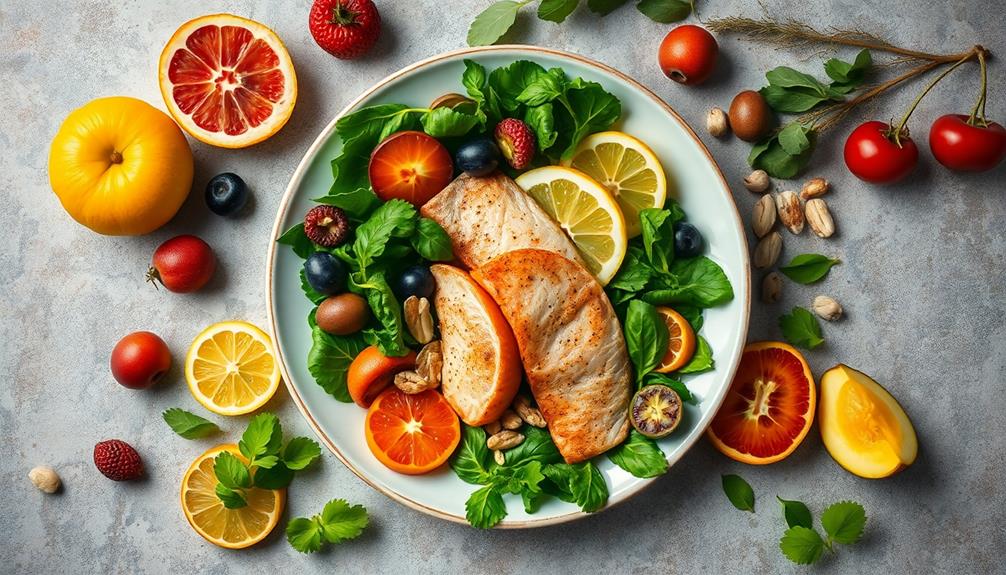
Let's explore some amazing nutrients that can boost your mood and keep your mind sharp! By including foods rich in omega-3s, vitamins, and minerals in your meals, you're setting yourself up for success in mental well-being.
For instance, dishes like Red-Braised Pork Belly not only provide essential nutrients but also offer rich flavors that can enhance your dining experience.
Essential Nutrients Overview
Essential nutrients play an essential role in maintaining mental well-being and enhancing cognitive function. They're like superheroes for your brain! When you think of brain health, remember these key players:
- Omega-3 fatty acids: Found in fatty fish and walnuts, they help reduce depression risk and boost cognitive function. Incorporating dishes like Nettle and Potato Soup can provide these vital fatty acids while also delivering a range of vitamins.
- Vitamins B6, B12, and folate: These vitamins are essential for neurotransmitter production. Without them, your mood might take a dip!
- Zinc and magnesium: These minerals, found in leafy greens and nuts, support brain function and emotional well-being.
- Antioxidants: A diet rich in fruits and vegetables offers these powerful nutrients, protecting your brain from oxidative stress.
When you regularly fill your plate with these essential nutrients, you'll likely notice an improvement in your overall mental well-being. You'll feel more emotionally stable, and your brain will thank you with better cognitive performance.
Key Food Sources
A vibrant plate filled with nutrient-dense foods can markedly uplift your mental well-being. To boost your mood, consider adding some key food sources to your meals. For instance, indulging in traditional Indonesian desserts like Kue Putu can provide a delightful sweet treat while also incorporating coconut and palm sugar, which can enhance your overall mood.
- Omega-3 fatty acids: Found in yummy fatty fish like salmon and crunchy walnuts, these are great for your brain and help reduce feelings of sadness.
- Vitamins B6, B12, and folate: These vitamins are plentiful in leafy greens and beans. They help your body make important chemicals that keep your mood steady.
- Zinc and magnesium: You can get these minerals from tasty nuts and seeds. They help manage emotions and support mental health.
- Antioxidant-rich fruits and veggies: Think colorful berries and vibrant leafy greens. They protect your brain from stress and can lower the chances of mental health troubles.
- Probiotic-rich foods: Enjoy yogurt and pickled veggies! These foods help keep your gut healthy, which is closely linked to how you feel emotionally.
Impact on Mood
Nutrients play a significant role in shaping your mood and mental well-being. Eating the right foods can really lift your spirits! Consider adding more healthy foods to your plate. Nutrients like omega-3 fatty acids found in fatty fish help your brain function better, making you feel happier.
Here's a quick look at some key nutrients that can boost your mood:
| Nutrient | Benefits | Food Sources |
|---|---|---|
| Omega-3s | Improve mood, reduce depression | Fatty fish, walnuts |
| Vitamins B6, B12, and Folate | Help produce serotonin | Eggs, leafy greens, beans |
| Antioxidants | Protect brain, enhance mood | Berries, spinach, nuts |
Don't forget about gut health! Probiotic-rich foods like yogurt can help keep your tummy happy, which is linked to better mental health. Remember, a balanced intake of healthy fats supports your brain, too! So, fill your meals with vibrant fruits and veggies while enjoying the delicious benefits they bring to your mood. Eating well is a fun way to feel great every day!
Impact of Diet on Mood

Eating a diet rich in omega-3 fatty acids, vitamins, and minerals can greatly boost your mood and cognitive function. Incorporating diverse ingredients from various cuisines, such as those found in Brazilian cuisine, can enhance the nutritional value of your meals.
When you choose healthy eating options, like fruits, vegetables, and whole grains, you help your body and mind thrive! This balanced diet lowers your risk of mood swings and irritability, keeping your overall mental state happier.
Here's why this matters:
- Nutrient Power: Certain nutrients, like those found in fish and leafy greens, can help your brain work better.
- Stabilized Energy: Eating proteins and healthy fats keeps your blood sugar steady, which means fewer mood swings!
- Happy Gut: A healthy gut plays a big role in how you feel. A diverse gut flora can boost serotonin, the mood-boosting neurotransmitter.
- Antioxidants: Regularly munching on colorful fruits and veggies can lower depression rates, making you feel more joyful.
Foods to Improve Mental Health
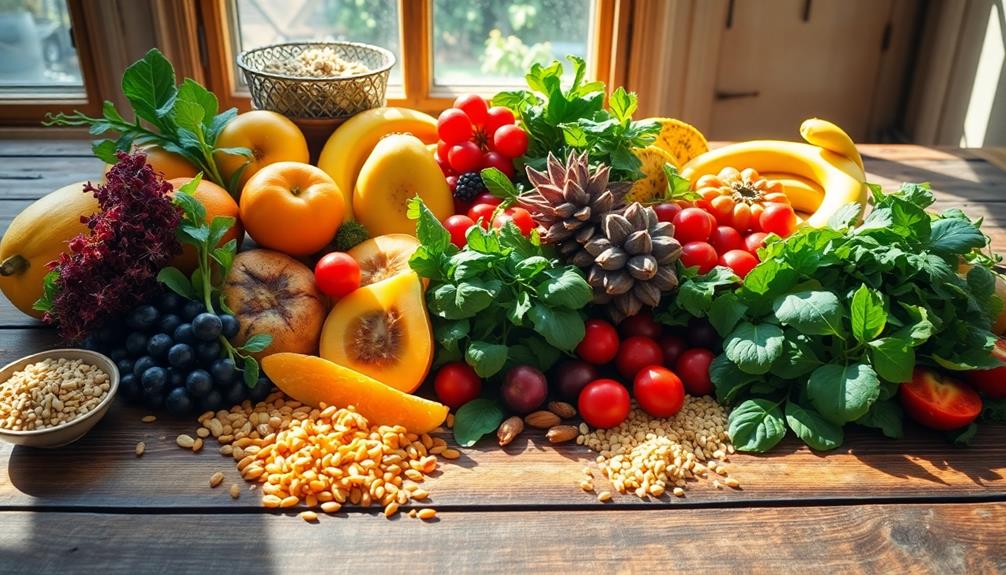
Incorporating specific foods into your diet can greatly boost your mental health. Just think about how yummy and fun it can be to make healthy choices! Here are some fantastic foods to include:
– Omega-3 fatty acids: Found in fatty fish like salmon, flaxseeds, and walnuts, these are great for your brain. They help lower the risk of depression and keep your mind sharp.
Additionally, traditional dishes such as Hiyashi Chuka can provide these healthy fats along with other nutritious ingredients.
- Antioxidant-rich foods: Fruits and veggies, like berries and spinach, protect your brain from stress. Eating colorful foods can brighten your mood!
- Whole grains: Foods like brown rice, oats, and whole grain bread give you energy and keep your blood sugar stable. This helps you feel good throughout the day.
- Probiotic-rich foods: Yogurt and fermented veggies are fun to eat and support a happy gut. A healthy gut can make your mood even better.
- Nutrient-dense foods: Filling your plate with foods that are packed with vitamins and minerals, while avoiding too much sugar and processed snacks, can lift your spirits.
Dietary Patterns for Better Mental Health

Adopting specific dietary patterns can greatly enhance your mental health. You might be surprised to learn that what you eat plays a big role in how you feel! For a better mood and lower rates of depression, consider these fun options:
– Mediterranean Diet: This tasty diet is packed with fruits, vegetables, whole grains, and healthy fats. It can help you feel happier and more energized!
Additionally, incorporating traditional dishes like Agnolotti can provide a delightful culinary experience while promoting well-being.
- Plant-Based Eating: Focusing on legumes, nuts, and whole foods isn't just good for your body; it's great for your mind, too! These foods give you the nutrients you need for improved mood and brain power.
- Whole Foods: Traditional diets from places like Costa Rica and West Africa emphasize whole, unprocessed foods. These diets can lower your risk of depression by 25%-35% compared to Western diets.
- Avoid Ultra-Processed Foods: Foods high in sugar and unhealthy fats can hurt your mental health. Steering clear of these can help you feel better overall!
The Role of Gut Health
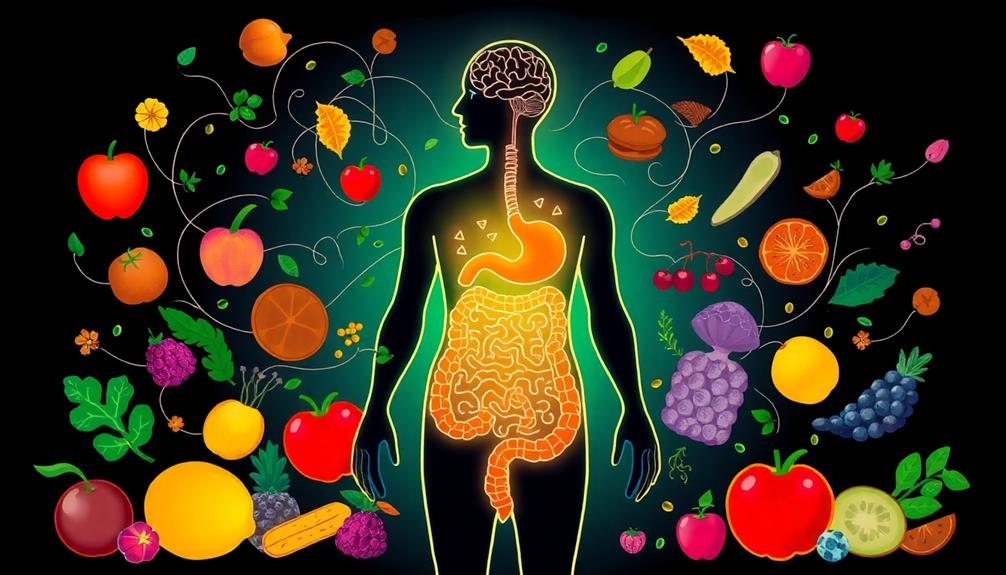
Your gut is more than just a place for food; it's a powerhouse for your mood!
Did you know that a happy gut can help you feel happier overall?
Incorporating fiber-rich foods, such as yekolo (roasted barley), and tasty probiotics, like yogurt, can support your gut health and boost your mental well-being!
Gut Microbiome and Mood
The gut microbiome acts like a symphony, orchestrating the production of neurotransmitters that greatly affect your mood. Did you know that about 90% of serotonin, a key neurotransmitter, is produced right in your gut? This means your gut health plays a big role in mood regulation!
A diverse and healthy gut microbiome can help lower levels of anxiety and depression, making it essential for your emotional well-being. Curiously, traditional diets, such as those featuring dishes like Chilaquiles, which utilize fresh ingredients and promote gut health, can notably contribute to improved mood and mental health.
Here are a few fun facts about the gut microbiome and mood:
- Dietary Choices Matter: Traditional diets rich in fiber and fermented foods can lower the risk of depression by 25%-35% compared to the Western diet, which is often high in processed foods.
- Gut Bacteria Balance: Eating probiotic-rich foods, like yogurt and fermented vegetables, promotes good gut bacteria, enhancing nutrient absorption and supporting your mental health.
- Watch for Inflammation: Poor dietary choices can upset your gut bacteria, leading to increased inflammation and negatively impacting brain function.
Probiotics for Mental Health
Probiotics play a significant role in enhancing mental health by fostering a balanced gut microbiome. When you enjoy foods rich in probiotics, like yogurt, kefir, and fermented vegetables, you're helping your gut stay happy and healthy.
For instance, traditional Lebanese beverages such as Laban Ayran aren't just invigorating but also beneficial for gut health. A balanced gut microbiome can boost the production of neurotransmitters, which are chemicals that help regulate your mood. Did you know that about 90% of serotonin, a key mood booster, is made in your gut?
Here are some exciting benefits of probiotics for mental health:
- Better Mood: A diverse gut microbiome is linked to improved mood.
- Reduced Anxiety: Probiotics can help lower anxiety levels, making you feel calmer.
- Dietary Choices Matter: Choosing traditional diets rich in probiotics can lower your risk of depression by 25%-35%!
Dietary Fiber's Impact
A significant amount of research shows that dietary fiber profoundly impacts gut health, which in turn influences mental well-being. When you eat high-fiber foods like fruits, vegetables, whole grains, and legumes, you're not just filling your belly; you're feeding your gut microbiome! A happy gut helps your body make neurotransmitters, which are essential for keeping your mood bright.
Check out how fiber-rich foods can boost your mental health:
| Food Type | Mental Health Benefit | Fiber Content |
|---|---|---|
| Fruits | Helps reduce anxiety | 3-5 grams per serving |
| Vegetables | Lowers risk of depression | 2-4 grams per serving |
| Whole Grains | Supports healthy mood | 3-7 grams per serving |
Eating a variety of these healthy foods means you can enjoy a diverse gut microbiome. This diversity can lead to lower rates of depression and anxiety. Plus, don't forget about fermented foods! They can work wonders for your gut health too. So, munch on that fiber, and let it work its magic for your mental health!
Strategies for Healthy Eating
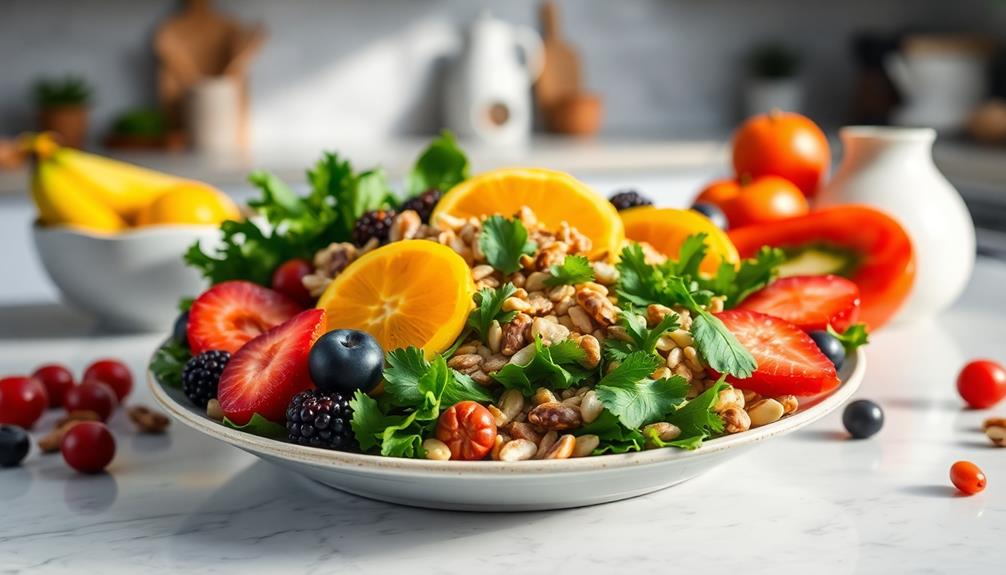
When you plan your meals in advance, you're more likely to make healthier choices and steer clear of processed foods when hunger hits. Here are some fun strategies to help you eat healthy and feel great!
- Choose Nutrient-Dense Foods: Fill your plate with colorful fruits, crunchy vegetables, whole grains, and healthy cooking oils. These foods not only taste delicious but also support your mood and cognitive function.
- Eat Regularly: Try to enjoy meals every 3-5 hours. This helps maintain stable blood sugar levels, keeping your energy steady and your mood bright.
- Practice Mindful Eating: Pay attention to your hunger cues and savor each bite. This makes meals more enjoyable and helps you build a better relationship with food.
- Keep a Food Diary: Jot down what you eat and how it makes you feel. This can help you see how your food choices impact your mood and energy levels.
Importance of Consistency in Diet

Maintaining a consistent eating pattern is essential for your mental and physical well-being. When you eat regular meals every 3-5 hours, you help keep stable blood sugar levels. This is crucial for consistent energy and mood stabilization throughout the day.
It all starts with consuming breakfast! A good breakfast kickstarts your metabolism and can make a big difference in how you feel and think for the rest of the day.
Here's why sticking to your meals matters:
- Stable Blood Sugar Levels: Regular meals help prevent those pesky energy dips.
- Consistent Energy: You'll feel more energetic and ready to tackle the day.
- Mood Stabilization: Eating regularly can keep irritability at bay, promoting better mental health.
On the flip side, skipping meals can leave you feeling tired and cranky. Just like a campfire, your body needs regular fuel to keep burning bright.
Mind-Body Connection and Nutrition

The mind-body connection reveals how deeply intertwined your physical health and mental well-being truly are. When you nourish your body with the right foods, you support your brain, too! Good nutrition helps produce neurotransmitters, essential for mood and cognitive function. It's like giving your brain a big hug!
Here's a quick look at how nutrition impacts your mental health:
| Nutrient | Benefits | Sources |
|---|---|---|
| Omega-3 Fatty Acids | Mood stabilization | Fish, flaxseeds, walnuts |
| Vitamins B6 & B12 | Boosts energy and mood | Eggs, dairy, leafy greens |
| Fiber | Supports gut microbiome health | Fruits, veggies, whole grains |
| Antioxidants | Reduces inflammation | Berries, nuts, dark chocolate |
| Probiotics | Enhances emotional regulation | Yogurt, fermented foods |
Eating a balanced diet rich in these nutrients can help reduce inflammation, which is great for your brain! A healthy gut microbiome means better mental health, too. So, let's choose delicious foods that make our bodies and minds happy! Remember, every bite counts in this joyful journey of nourishing both your body and mind.
Frequently Asked Questions
What Is the Connection Between Diet and Mental Health?
Your diet directly influences your mental health. When you eat nutrient-rich foods, you support your brain function. Conversely, processed foods can lead to mood swings and cognitive decline, showing the importance of mindful eating choices.
Can You Get Depressed While Dieting?
Yes, you can get depressed while dieting. Restrictive eating often leads to nutrient deficiencies and increased stress, impacting your mood. Prioritizing balanced, nutrient-rich foods can help stabilize your emotions and improve your mental well-being.
How Does Your Body Change Once You Start Eating Healthy?
Once you start eating healthy, your body feels energized, your mood stabilizes, and you notice improved focus. Nutrient-rich foods enhance your overall well-being, making you more resilient to stress and reducing feelings of fatigue.
Why Do I Feel Anxious When Starting a New Diet?
You might feel anxious when starting a new diet because of uncertainty and fear of change. Disrupting emotional eating patterns, experiencing withdrawal from sugar, and facing social pressure can heighten your anxiety during this shift.
Conclusion
Eating well isn't just good for your body; it's a recipe for a happy mind! Imagine little Emma, who used to feel sad and tired. After her family started cooking colorful meals together, full of fruits and veggies, she began to smile, play, and laugh more. Remember, by choosing the right foods, you can boost your mood and feel fantastic! So, let's make mealtime fun and nourishing for everyone! Your mind and body will thank you! Sharing meals not only strengthens bonds but also brings incredible benefits to your mental health. The psychological effects of eating together as a family or with loved ones include reduced stress, increased happiness, and a sense of belonging. So, gather around the table, savor the delicious flavors, and enjoy the magical connection that nourishing foods and togetherness create!



